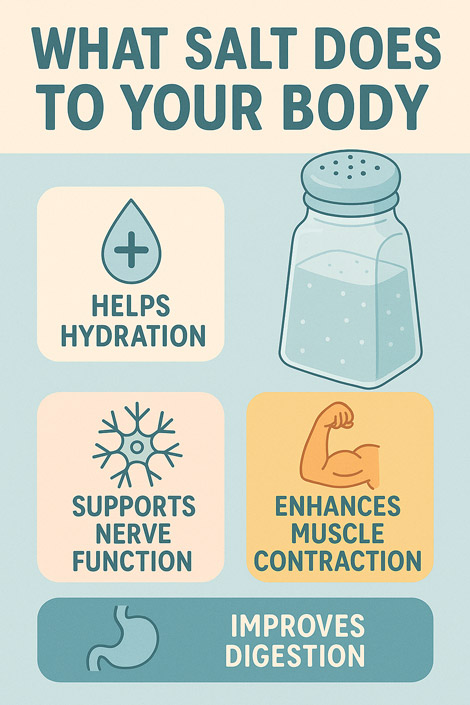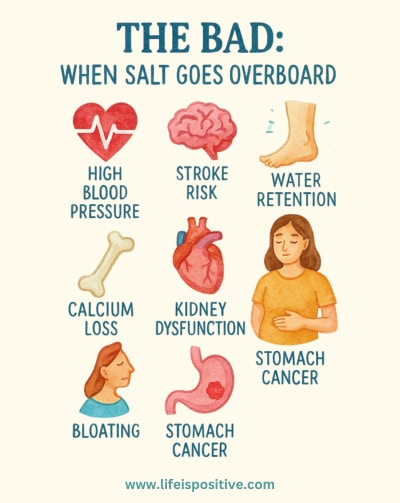Salt—it’s in your chips, your soups, your favorite comfort food, and let’s be honest, probably your tears after binge-watching a sad movie. But have you ever wondered what salt does to your body behind the scenes?
What salt does to your body ranges from helping nerve function to keeping your hydration in check. But too much? It can crank up your blood pressure and puff you up like a balloon. Let’s break down the salty truth and find that sweet (or savory) spot of balance your body will thank you for.
What Salt Does to Your Body?
Salt isn’t just some random seasoning your taste buds adore—it’s actually an essential mineral. Your body needs sodium to function.
It helps maintain fluid balance, supports nerve function, and keeps your muscles (including your heart) working smoothly. Without it, things can go haywire. But, as with most things in life, balance is key.
Too much salt, on the other hand, can wreak havoc. From bloating to high blood pressure, excess sodium intake isn’t doing your body any favors.
So, let’s break it down and see exactly what salt does to your body—the good, the bad, and the downright ugly.
The Good: Why Your Body Needs Salt
Before we start villainizing salt, let’s give credit where it’s due. Sodium plays several crucial roles in keeping your body in check:
1. Regulates Fluid Balance – Sodium helps your body hold onto the right amount of water. Without it, dehydration can hit hard and fast.
2. Supports Nerve Function – Ever had muscle cramps after sweating too much? That’s because sodium helps transmit nerve signals, keeping everything from your reflexes to your brain function sharp.
3. Aids Muscle Contractions – Your heart is a muscle, and it depends on sodium to beat properly. Low sodium levels can lead to irregular heartbeats and fatigue.
4. Helps Nutrient Absorption – Sodium assists in absorbing important nutrients, like glucose and amino acids, ensuring your body gets the fuel it needs.
So, salt is not the enemy. But before you go shaking an extra pinch onto your fries, let’s talk about the downside.
Read: Is Epsom Salt Bath Your Secret to Ultimate Relaxation?
The Bad: When Salt Goes Overboard
Unfortunately, most of us are consuming way more salt than we should. The recommended daily limit? About 2,300 mg (that’s roughly one teaspoon). The reality? The average person consumes 3,400 mg or more per day. And that can lead to trouble. Here’s what happens when you overdo it:
1. High Blood Pressure (Hypertension) – Excess sodium makes your body retain water, increasing blood volume and putting extra pressure on your arteries. Over time, this can lead to high blood pressure, a major risk factor for heart disease and strokes.
2. Water Retention & Bloating – Ever felt puffy or noticed your rings feeling tighter after a salty meal? That’s because too much salt causes your body to hold onto extra water, leading to bloating and puffiness.
3. Kidney Problems – Your kidneys work hard to filter out excess sodium. When there’s too much, they struggle to keep up, which can lead to kidney stones or, in severe cases, kidney disease.
4. Increased Risk of Heart Disease – Too much sodium can thicken your arteries over time, increasing the risk of heart attacks and strokes. Not exactly what you want as a side effect of your favorite snack.
5. Weakened Bones – Excess sodium can leach calcium from your bones, making them weaker over time. This increases the risk of osteoporosis, especially as you age.
So, if you’re wondering what salt does to your body when consumed in excess, it’s not pretty. But before you swear off salty foods forever, let’s find some balance.
The Ugly: Hidden Salt Bombs in Everyday Foods
Think you don’t eat that much salt? Think again. The real culprit isn’t always the salt shaker—it’s the sneaky sodium hiding in processed and restaurant foods. Here are some of the worst offenders:
• Processed meats (bacon, sausage, deli meats)
• Canned soups and sauces
• Frozen meals
• Fast food
• Snack foods (chips, pretzels, crackers)
• Cheese (yep, even that “healthy” feta can pack a salty punch)
• Bread and cereals (even the ones that don’t taste salty!)
Even if you don’t think you eat a lot of salt, chances are, you’re getting more than you realize.
Read: How Salt Lamps Are Helping People With Anxiety
Finding Balance: How to Keep Your Salt Intake in Check
Now that we’ve covered what salt does to your body, the real question is—how can you keep it in check without sacrificing flavor? Here are a few easy ways to cut back on sodium without feeling deprived:
1. Read Labels – Check nutrition labels for sodium content. If a single serving has more than 20% of your daily limit, it’s best to opt for a lower-sodium option.
2. Cook at Home – Restaurant meals are often loaded with hidden salt. Cooking at home gives you full control over your sodium intake.
3. Use Herbs & Spices – Flavor your food with garlic, lemon, pepper, or fresh herbs instead of salt. You’d be surprised how much flavor you can get without the extra sodium.
4. Rinse Canned Foods – If you use canned beans or vegetables, rinse them under water to remove excess salt.
5. Go Fresh When Possible – Fresh, whole foods like fruits, veggies, and lean proteins naturally contain less sodium. The more whole foods you eat, the easier it is to keep salt intake in check.
Final Thoughts: What Salt Does to Your Body
As you’ve seen, understanding what salt does to your body isn’t just about science—it’s about self-care. Salt isn’t the villain, but like all things, balance is key. When used mindfully, it supports your body’s natural rhythms and helps you thrive. But when it sneaks into every bite unchecked, it can quietly throw your system off balance.
So, as you move forward, tune in. Pay attention to how your body feels, how your energy flows, and what your plate looks like. Being aware of what salt does to your body is a powerful step in choosing nourishment that honors your health, not just your taste buds.
You don’t need to cut it all out—just get curious, be intentional, and let your choices come from a place of love and wisdom. Your body will thank you. And so will your heart—literally.
Stay salty (but in the right way).
For more empowering content, connect with our vibrant community here ➡️ Social Media


